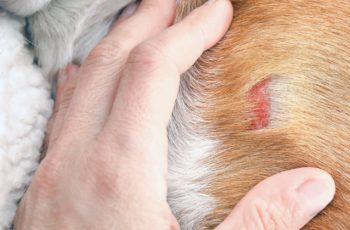Let’s assume that you have a loving pup by your side and he adores cream cheese for an afternoon snack. You might have heard that dogs are intolerant to dairy products. If that is the case, then being a dog owner a concerning question might give you a headache, that is, ‘Is cream cheese bad for your dog?‘. We will try to provide you with insight so that you can decide for yourself whether to give cream cheese to your dog or not.
Cream cheese is an undeveloped cheese either with cream or with a mixture of milk and cream. It is a very soft and smooth and mild cheese with a sweetened taste. Cream cheese for dogs is generally white but has a yellowish tone because of the existing high moisture and fat content in it.
Now, let’s look at the ingredients of cream cheese for dogs, its benefits and its side effects.
Ingredients of cream cheese
Cream cheese for dogs contains many nutritional ingredients such as fats, carbohydrates, protein, and also minerals like calcium, potassium, sodium, magnesium, etc. It also contains some amounts of vitamin B6 and C and iron. Usually, 100 gms of Cream cheese contain 342 calories which include 34 gms of fat, 6 g of protein, 4.1 g of carbohydrate, 321 mg of sodium, 138 mg of potassium, 110 mg of cholesterol, and little to moderate amounts of magnesium, calcium, iron and vitamin B6, C, and D. It also contains very little portions of the element cobalamin.
Benefits of cream cheese
There are some significant benefits of cream cheese for dogs that you might not know of. These include-
- The protein content in cream cheese is very good for strengthening bones and building muscles. Although they are not very high and constitute 7-8% of the total nutritional content of cream cheese, still they are sufficient enough to function for your dog.
- The essential fatty acids in cream cheese help the dogs to maintain a shiny coat and lucrative fur. Healthy fatty acids like Omega 3 fatty acids which are polyunsaturated fats help maintain the healthy body functioning of your dog.
- Vitamin A, present in cream cheese, helps with brain development at the puppy stage and also with eyesight problems, which are more beneficial for your dog in later years.
- Vitamin B and C content of cream cheese helps the dogs to build up and maintain a solid nervous system and immune system.
- Calcium, present in cream cheese, is very beneficial for strong bones and teeth. Calcium is also an essential component in maintaining a healthy heart rate and proper blood flow.
- You can hide any medicine or pills in cream cheese as your dog won’t understand the bitter taste of pills because of the strong taste cream cheese provides.
Side effects of Cream cheese
Cream cheese is quite a controversial food for dogs. So, to answer the question – “can dogs have cream cheese?”, we need to talk about the side-effects of cream cheese unbiasedly too, along with the benefits provided by cream cheese to your dogs. Just keep in mind that every dog is unique in his or her way, and you, as a responsible dog owner, should counterbalance the benefits and the side effects and then proceed to give him cream cheese.
The side effects of cream cheese are –
Cream cheese is low in protein content. Since dogs are carnivorous by nature, their diet should comprise at least 75-80% of meat as meat is high in protein content. Cream cheese, being low in protein, cannot supplement the nutritional need for protein in your dog’s body.
On the other hand, cream cheese contains high amounts of Omega 6 Fatty Acids, which are high in saturated fats. Saturated fats, present in cream cheese, can make your dog lethargic and lead to his gaining extra weight, all the while making him prone to heart diseases and causing irregular heart rhythm and thyroid problems if the cream cheese is provided to him for a prolonged period, or in high contents.
Cream cheese has a huge water content of more than 50%. High water content in cream cheese is responsible for cream cheese having a really poor shelf life of fewer than 14 days after you unseal its packaging. The high moisture content also makes it a heavy breeding ground for microbes and other forms of bacteria.
Additional flavours, present in store-bought versions of cream cheese, contain additional flavours and fragrances like rose petals, which can be harmful to your dog’s health. Artificial flavouring substances like vanilla and butterscotch flavours can cause choking in your dog, and may also lead to serious problems like diarrhoea, vomiting, and kidney problems.
Cream cheese also has a high content of cholesterol in them, and this high percentage of cholesterol in cream cheese for dogs can lead to serious problems like hyperlipidemia or high content of lipid in the blood. This can lead to serious issues like arterial blockage and increased blood pressure. The high cholesterol content in cream cheese is another reason why it is not prudent to feed cream cheese to your dog too often or regularly.
So, – “can dogs eat cream cheese?”, of course, he can! Just be wary of his bodily tendencies, and provide him moderate amounts of cream cheese. If you see a sudden outbreak of vomiting, diarrhoea lasting for more than a day or two, or a lethargic attitude occurring within a week of feeding him with cream cheese, stop any further cream cheese containing food and consult your vet immediately as your dog may not be reacting well to cream cheese.
Cautionary warnings
Dogs with extra sensitive tendencies, like dogs who are lactose intolerant or dogs with gluten intolerances should never be provided with cream cheese.
You should never provide more than 1 spoonful of cream cheese for dogs as higher amounts of cream cheese can cause serious digestion issues in your dogs.
After you unpack store-bought cream cheese, you should not serve it to your dog for more than two weeks.
When you provide cream cheese as a treat to your dogs, never sprinkle them with onion, salt, sugar, garlic, or other spices as it can lead to severe complications.
Final Words
Cream cheese, although a controversial food, can be beneficial to your dog sometimes, provided you serve it to him not more than twice a week. If you see some allergic reactions or other tendencies, consult your vet. You can also opt for some protein-rich substitutes like peanut butter in place of cream cheese.


